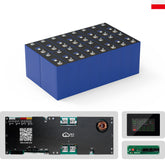Difference Between EVE MB30 and MB31 Batteries
When selecting the right lithium battery for your application, understanding the difference between EVE MB30 and MB31 batteries is crucial. Both models are well-regarded in the market for their performance, safety, and versatility. However, subtle yet important distinctions between them can impact your choice depending on your specific needs. In this comprehensive guide, we will explore every difference in detail to help you make an informed decision.
- Difference Between EVE MB30 and MB31 Batteries in Terms of Basic Specifications
- Physical Difference Between EVE MB30 and MB31 Batteries
- Difference Between EVE MB30 and MB31 Batteries in Performance and Lifespan
- Chemical Composition Difference Between EVE MB30 and MB31 Batteries
- Difference Between EVE MB30 and MB31 Batteries in Real-World Applications
- Cost Difference Between EVE MB30 and MB31 Batteries
- Availability and Market Trends Difference Between EVE MB30 and MB31 Batteries
- Summary of Key Difference Between EVE MB30 and MB31 Batteries
- How to Decide Based on the Difference Between EVE MB30 and MB31 Batteries
- Final Thoughts on the Difference Between EVE MB30 and MB31 Batteries
Difference Between EVE MB30 and MB31 Batteries in Terms of Basic Specifications
Key Specifications Overview
When comparing EVE MB30 and MB31 batteries, the first difference lies in their basic specifications. Both are cylindrical lithium-ion cells, typically used in large-scale battery packs, energy storage systems (ESS), electric vehicles (EVs), and industrial applications. However, here’s how they stack up against each other:
|
Specification |
EVE MB30 |
EVE MB31 |
|
Nominal Capacity |
30Ah |
31Ah |
|
Nominal Voltage |
3.2V |
3.2V |
|
Maximum Charge Voltage |
3.65V |
3.65V |
|
Cut-off Voltage |
2.5V |
2.5V |
|
Maximum Continuous Discharge Current |
1C (30A) |
1C (31A) |
|
Weight |
~830g |
~850g |
|
Dimensions (Diameter x Height) |
~32mm x 150mm |
~32mm x 155mm |
Capacity and Voltage
One of the most noticeable differences is in the nominal capacity. The MB31 offers a slightly higher capacity (31Ah) compared to MB30 (30Ah). Although a 1Ah difference might seem minimal, in applications that require large battery banks, this small increment can add up to a significant total capacity improvement.
Physical Difference Between EVE MB30 and MB31 Batteries
Dimensions and Weight
The MB31 is marginally taller and heavier than the MB30. This difference may affect the design of battery packs, especially if space and weight are critical constraints.
Impact on Pack Design
If you’re designing a battery pack with tight dimensional tolerances, the 5mm height difference and 20g weight difference could influence whether MB30 or MB31 is the better fit. In portable or weight-sensitive applications, the MB30 might have a slight edge.
>>See also How to Top Balance 16 Cells Effectively
Difference Between EVE MB30 and MB31 Batteries in Performance and Lifespan
Cycle Life
Both the MB30 and MB31 boast excellent cycle life, typically rated at 4000+ cycles at 80% Depth of Discharge (DoD). However, field reports suggest that the MB31 sometimes performs slightly better under high-load conditions due to improved internal design.
Thermal Stability
Another important difference is in thermal management. The MB31 employs slightly updated materials that offer better heat dissipation, which can be advantageous in high-performance or high-temperature environments.
Efficiency
Efficiency tests often show that MB31 cells maintain slightly higher voltage under load, translating to marginally better energy efficiency across discharge cycles. This subtle difference becomes more pronounced in large battery systems.
Chemical Composition Difference Between EVE MB30 and MB31 Batteries
Internal Chemistry
Both batteries use Lithium Iron Phosphate (LiFePO4) chemistry, known for its stability and safety. However, the MB31 incorporates a refined electrolyte formula that enhances ionic conductivity and reduces internal resistance. This chemical difference contributes to its improved performance characteristics.
Safety Features
Both models meet stringent safety standards (UL, IEC, UN38.3). The MB31 benefits from slightly upgraded internal separators and an advanced venting mechanism to handle thermal runaway more effectively—a crucial difference for safety-conscious applications.
Difference Between EVE MB30 and MB31 Batteries in Real-World Applications
Electric Vehicles (EVs)
In EV applications, every bit of capacity and thermal management matters. The MB31’s higher capacity and better thermal properties make it a preferred choice in newer designs where performance and longevity are paramount.
Energy Storage Systems (ESS)
For ESS installations, the minor capacity difference can result in higher total storage capacity when scaling up to hundreds or thousands of cells. Additionally, MB31’s improved efficiency leads to lower system losses over time.
Industrial Equipment
When used in industrial tools and machines, the difference in cycle stability and heat tolerance means MB31 cells often last longer in harsh operational conditions compared to MB30 cells.
Cost Difference Between EVE MB30 and MB31 Batteries
Initial Purchase Price
As of current market trends, MB31 cells typically command a 5-10% premium over MB30 cells. The price difference reflects the marginal gains in capacity, efficiency, and thermal stability.
Total Cost of Ownership
When factoring in cycle life and system efficiency, the total cost of ownership can sometimes favor MB31, especially in high-demand or long-lifespan applications. However, for budget-sensitive projects, MB30 still offers excellent value.
Availability and Market Trends Difference Between EVE MB30 and MB31 Batteries
Supply Chain
Both MB30 and MB31 are widely available through authorized EVE distributors and secondary markets. However, MB31 production has ramped up in recent years, making it more commonly stocked.
Compatibility with Existing Systems
For existing battery packs originally designed around MB30 cells, integrating MB31 requires verification of physical fit and pack rebalancing due to slight capacity differences. Upgrades are generally feasible but should be carefully engineered.
Summary of Key Difference Between EVE MB30 and MB31 Batteries
|
Feature |
MB30 |
MB31 |
Key Difference |
|
Capacity |
30Ah |
31Ah |
+1Ah advantage for MB31 |
|
Thermal Stability |
Good |
Excellent |
Better in MB31 |
|
Cycle Life |
4000+ |
4000+ (better under high load) |
Marginal advantage for MB31 |
|
Weight |
~830g |
~850g |
MB31 is heavier |
|
Height |
~150mm |
~155mm |
MB31 is taller |
|
Cost |
Lower |
Slightly higher |
MB31 premium justified for performance |
>>See also Using a Car Battery for a Trolling Motor Explained
How to Decide Based on the Difference Between EVE MB30 and MB31 Batteries
When to Choose EVE MB30
Budget-sensitive projects
Applications with strict weight or size limits
Legacy system compatibility
When to Choose EVE MB31
High-performance EV or ESS applications
Environments with elevated temperatures
Projects where long-term efficiency and lifespan are key priorities
Final Thoughts on the Difference Between EVE MB30 and MB31 Batteries
Choosing between EVE MB30 and MB31 batteries ultimately comes down to understanding the subtle but meaningful differences between them. Whether you prioritize cost, efficiency, cycle life, or thermal stability, each battery offers its unique advantages. Carefully evaluating your application’s specific needs will ensure you select the right battery model.
In conclusion, the difference between EVE MB30 and MB31 batteries is not merely academic—it directly impacts performance, safety, and cost-effectiveness in real-world applications. By staying informed, you can make smarter decisions and optimize your battery-powered systems for success.
























Leave a comment
All blog comments are checked prior to publishing